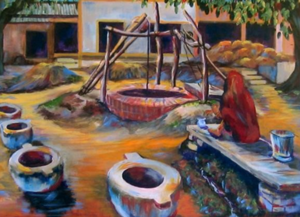Talk:Varadarāja (17th century CE)
By Vishal Agarwal
Several hundred years ago, there lived a child named Varadarāja. He was not a very intelligent child and never understood anything that his teacher taught him. The other students in his class made fun of him and called him a dumb boy.
One day, Varadarāja got so upset because of this constant teasing by his classmates that he decided to end his life. He wanted to drown himself in the well on the way to his home.
Just as he was about to jump into the well, he noticed something. On the stone wall around the well, there was a deep, straight mark. The mark was caused by the rope that rubbed against the stone when buckets of water were drawn up from the well.
Varadarāja thought to himself, “This stone is so hard, and the rope is so soft. But, when this rope keeps rubbing against the stone, it causes a mark even on the hard material of the stone. Likewise, if I keep practicing my teacher’s school lessons at home, my dumb mind may also become intelligent, and I will start understanding everything one day.”
Varadarāja became very happy as he thought this. He decided not to jump into the well and started studying hard at home every day after his school was over. Soon, Varadarāja became very intelligent and knowledgeable. In fact, after a few years, he became one of the greatest scholars of the Sanskrit language and wrote a grammar called Laghusiddhānta Kaumudī, which is studied by Sanskrit scholars even today.
The moral of the story is that we must never pity ourselves and should also never run away from challenges. We should not think of ourselves as weak or unintelligent. If you find a subject in your school too difficult, keep studying and ask your teachers and parents for help. After a lot of hard work, you will start understanding it and will no longer find it difficult.

